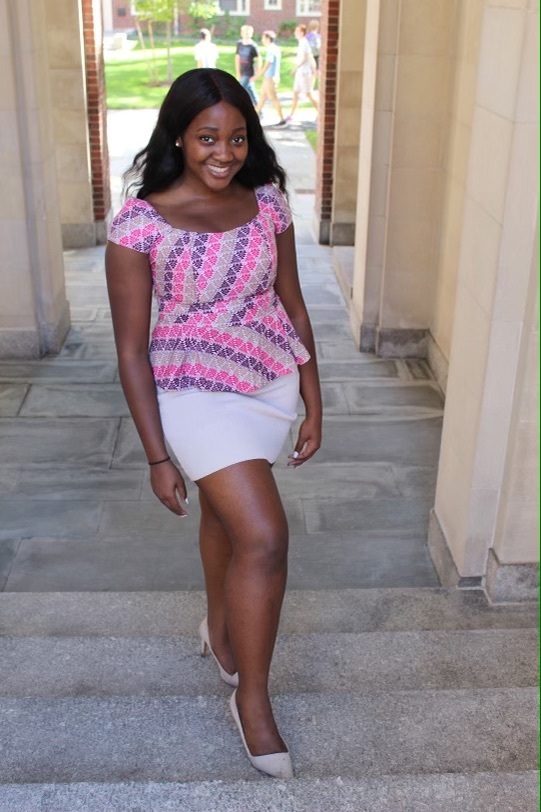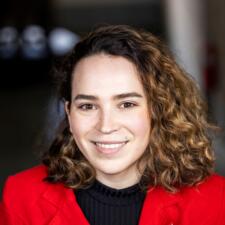Chinaza Asiegbu (History, Secondary in African Studies and French Citation, 2022) received a Summer Internship Grant from CES in 2020 to conduct a virtual internship at the United Nations Educational Scientific and Cultural Organization in Paris. She also participated in the Europe in Washington Workshop on Democracy and Transatlantic Relations, made possible by a generous grant from Elizabeth Sherwood-Randall (AB ’81) who currently serves as White House Homeland Security Adviser.
There are many words that could describe Chinaza Asiegbu; Jersey Girl, child of immigrants, Nigerian American, history lover, humanitarian, advocate, etc. Asiegbu realized early that it’s through the combination of all these identities that she is the strongest and uniquely positioned to create positive change in her community.
Growing up in New Jersey to immigrant parents, Asiegbu always felt a sense of duality. “I always knew I had a home in Nigeria, a connection to Nigeria and my Nigerian heritage. I also was aware very young what a privilege it is to be in the United States and to have the resources and opportunities to really be able to do what I wanted to do and chase my dreams.”

When Asiegbu arrived at Harvard she wasted no time chasing those dreams. This meant exploring her love for history and understanding the world through scholarship. Despite her distance from home, she could still hear what her dad always says, “it’s not about you it’s about the community you represent.”
This didn’t only mean New Jersey or Nigeria, it also meant Harvard and the new communities she was building. As soon as Asiegbu arrived on campus, she started rooting out opportunities and forming relationships with staff and faculty who were dedicated to fostering and curating her interests.
It was through this dedication that she received an internship to work in the chambers of federal judge Mark L. Wolf in his international anti-corruption NGO Integrity Initiative International (III).
She worked mainly as a researcher on Nigeria to examine what is legal in relation to international anti-corruption. This work exposed her to the broader fields of human rights and international development, but also connected her intellectual strengths with her personal heritage. “A lot of my loves started to push me towards human rights. Part of my family has a history of poverty in Nigeria. They are dealing with very real issues of food insecurity or violent instability in certain parts of the country, and I want to be part of the solution.”
After completing this internship, it was pure happenstance which first brought her to the Minda de Gunzberg Center for European Studies and a simple, casual invitation to meet summer grant recipients who were sharing stories about their experiences. Asiegbu came to the Center, but had very low expectations. “I'm interested in African development, so I was thinking, what does European studies have to do with African development? I felt like the odd one out.”
Asiegbu quickly found her place and realized that the unfortunate legacy of colonialism meant there was an indelible link between Europe and Africa. “Colonialism is a big part of the story of Africa. Europe is going to constantly be a feature in African life, at least African political life. I realized that it's essential for people like me to be involved in CES, as well as the Center for African Studies, because it's important to bring the African perspective into the European space.”
Asiegbu became involved in the CES community, applied for an internship in 2020 and joined 15 fellow students on. CES’ inaugural Europe in Washington Workshop in January 2019.
In Washington, she remembers moving through many high-power places such as the IMF and Brookings Institute, listening to policy makers and global affairs leaders talk about international relations through a decidedly Western lens.
Asiegbu felt driven to take her seat at the table and push back at what she saw as a slanted view of global relations. “Just to be in that room and ask questions about their engagement with Africa, made me realize that this is something I could do for the rest of my life. I want to be involved in sharing African voices and allowing African countries to have a seat at these tables.”
Even as she pushes the boundaries, Asiegbu remains grounded by the people around her. Especially, her parents and the Nigerian-American community that she grew up in. “As I became passionate about research and studying Nigeria and Africa, they continuously checked me. Ensuring that as I was doing this research, I continued to see people as people and loop in personal narrative, break out of the academic vacuum, and enrich my knowledge through community engagement.”
Whether it’s as a policymaker or human rights advocate, Asiegbu has her feet firmly planted on the ground and her eyes trained on where she wants to be. Remembering her father’s words, she honors her community and her own identity as both a Nigerian and American. An identity that empowers her to seek a fundamental shift in how Africa is discussed in the halls of global politics and most importantly making sure that African voices are amplified and included in these discussions. She believes that change is coming and is determined to be a part of it.
